
bit.ly/2EhwjTL
يَهْدِى بِهِ اللهُ مَنِ ٱتَّبَعَ رِضْوَنَهُ سُبُلَ ٱلسَّلَامِ
{ By which Allah guides those who pursue His pleasure to the ways of peace…}Nonviolence is a more powerful tool than violence.
“Violence can kill the liar, the racist, the terrorist”;
but it does not kill the “lies that sustain an unjust system, racism, or terrorism.”[24]
It is time to learn the non-violent struggle.
And it is time to learn it from those freedom fighters who have fought this fight before.
Until to the point when the situation calls for self-defense, which is a right to every human being, non-violent strategies & tactics have to be understood and used.
May Allah ![]() forgive all those who committed mistakes in the struggle for justice and dignity when they swerved from the right path.
forgive all those who committed mistakes in the struggle for justice and dignity when they swerved from the right path.
It has to be explored if & how the struggle for people's demands for justice, and freedom from oppression and humiliation - be they Muslim or not - should be fought without the recourse to militancy[5] and violence: by means of non-violence or the unarmed struggle.[6]
This way of non-violence is a difficult road - with temptations and hardship, facilitated only by the grace of Allah Almighty ![]() !
!
In cases of massive violence from the state - military/ neo-colonial powers/ settler-occupiers it is not always possible to respond non-violently. So ”non-violence should be a tactic — not an ideology preached from the sidelines to victims of massive violence.”[7]
⇒ The principle is that Islam was totally non-violent in its beginning, that is during the first 13 years the Muslims did not at all retaliate the attacks and repression which they had to endure at the hands of the Meccans.
This Islamic principle of non-violence stems from nothing less than the Quranic message:[ch.5.] always finding the best way and strategy for the good pleasure (or contentment - رِضْوَانُه ) of Allah ![]() , with the least suffering or hardship on people. The Islamic message of the Quran, the way of the Prophet ﷺ and the Islamic tradition of the following centuries define the methods of war and peace, with peace being the norm, war being the exception, where war is never an aim in itself.[8]
, with the least suffering or hardship on people. The Islamic message of the Quran, the way of the Prophet ﷺ and the Islamic tradition of the following centuries define the methods of war and peace, with peace being the norm, war being the exception, where war is never an aim in itself.[8]
Furthermore there are abundant examples during the lifetime of the Prophet ﷺ in his diplomacy or f.ex. when he averted violent acts by his followers, not the least by `Umar ibn al-Khattab or later by Khālid ibn Wālid (ra). These examples clearly show that he  always chose the non-violent alternative, when possible.[1]
always chose the non-violent alternative, when possible.[1]
As Rabia T. Harris writes: ”In the world, Muhammad  was the civilizer of the Arab tribes, and his heart was with all oppressed people everywhere. His historical mission was no more, and no less, than the establishment of peace and justice where cruel custom and tyranny had reigned. He worked in, and with, the substance of his times, toward a goal far beyond the horizons of his times. He used extraordinary spiritual means toward equally extraordinary political ends. Through his labor and insight, a great world culture emerged out of a fractured landscape of petty tribal wars. If we trouble to look, we easily find in Muhammad
was the civilizer of the Arab tribes, and his heart was with all oppressed people everywhere. His historical mission was no more, and no less, than the establishment of peace and justice where cruel custom and tyranny had reigned. He worked in, and with, the substance of his times, toward a goal far beyond the horizons of his times. He used extraordinary spiritual means toward equally extraordinary political ends. Through his labor and insight, a great world culture emerged out of a fractured landscape of petty tribal wars. If we trouble to look, we easily find in Muhammad  a master strategist of nonviolence.”[5c]
a master strategist of nonviolence.”[5c]
“This lesson (that violence is never an acceptable answer to provocation) is best contained in the example of the Prophet Muhammed  himself, who was repeatedly subjected to the worst treatment by his enemies, only to consistently disregard these insults and instead take the path of forgiveness, mercy and compassion. This is why he is known to Muslims as “the Mercy to all worlds”.[16]
himself, who was repeatedly subjected to the worst treatment by his enemies, only to consistently disregard these insults and instead take the path of forgiveness, mercy and compassion. This is why he is known to Muslims as “the Mercy to all worlds”.[16]
How the Prophet ﷺ managed to work for peace, reconciliation and non-violence (when not attacked) will be shown in [ch. 5b. & 5c.]
”Abdul-Ghaffar Khan
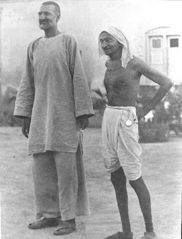
developed his nonviolent understanding independently of Gandhi, through reading the Qur’an in jail. (He) raised an army of 100,000 unarmed soldiers.” [2]
”Khan’s career began with promoting education through opening schools in the region, led to promoting political independence for India through resistance to the British. In time, he created a massive nonviolent resistance organization that paralleled Gandhi’s movement in central India, before the partition of Pakistan and India. His leadership focused on Islam as a way of peace, and he worked tirelessly to teach the warring Pashtun people a new way of life within their own culture as well as in relation to external conflicts. The partition immersed him in new battle for democracy, justice, and independence for the Pashtuns that filled the remainder of his life.”[3]
NB: This was the historic period of India's liberations struggle: casting off the joke of British colonialism, where Gandhi and Abdul-Ghaffar Khan were leaders among millions. Had they won against the separationists, it would have been an example set for Muslim-Hindu peaceful coexistence. 1000 times better than what we have today with Pakistani extremists on one side and Hindu extremists on the other.
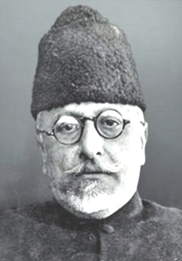 ”The idea of nonviolent civil disobedience is to act against injustice and unjust laws. This has been Mahatma Gandhi's motivation, as well as Maulana Abul Kalam Azad's. For an Islamic religious authority of Maulana Azad's stature and caliber to embrace nonviolent activism for the sake of social justice, it is a significant change in the course of action in Islam against oppression. The concepts of justice/injustice, oppression, and social justice need to be examined in historical context, beginning with early Islamic history, followed by the period of British colonial rule and the Indian struggle against it as led by Mahatma Gandhi and Maulana Azad. This article analyzes the principles of Maulana Azad in the struggle against injustice, and how that compares to the principles and practices of Islamic militancy and jihadism. The latter are viewed as illegitimate, while Maulana Azad's Islamic credentials render his acceptance of nonviolent civil disobedience as far more legitimate.”[23]
”The idea of nonviolent civil disobedience is to act against injustice and unjust laws. This has been Mahatma Gandhi's motivation, as well as Maulana Abul Kalam Azad's. For an Islamic religious authority of Maulana Azad's stature and caliber to embrace nonviolent activism for the sake of social justice, it is a significant change in the course of action in Islam against oppression. The concepts of justice/injustice, oppression, and social justice need to be examined in historical context, beginning with early Islamic history, followed by the period of British colonial rule and the Indian struggle against it as led by Mahatma Gandhi and Maulana Azad. This article analyzes the principles of Maulana Azad in the struggle against injustice, and how that compares to the principles and practices of Islamic militancy and jihadism. The latter are viewed as illegitimate, while Maulana Azad's Islamic credentials render his acceptance of nonviolent civil disobedience as far more legitimate.”[23]
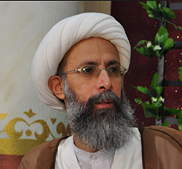 We are not distracted by the fact that Shaykh Nimr al-Nimr belonged to another madhhab of Islam, and as long as we don't slander each other - then in the end it is Allah Who is the Judge.
We are not distracted by the fact that Shaykh Nimr al-Nimr belonged to another madhhab of Islam, and as long as we don't slander each other - then in the end it is Allah Who is the Judge.
In this case Shaykh Nimr al-Nimr - and the people he represented - had a problem with the government of Saud. A problem of structural discrimination, harassment and injustice. As far as we know, he clearly advocated non-violence, but instead became victim of the deadly violence of the Saud.
He did have a ”different vision for resistance” and even if there was no immediate success for his cause, in the end the blame will be on the Saud government.
[ □ comment: Regarding the latest news from this country the repression is absurd and only getting worse. 20220817 ]
”In explaining how the movement [of resistance] should operate, Shaykh Nimr repeatedly emphasized that “the roar of the word” is mightier than the sound of bullets. He explained that authorities would want protesters to use weapons, because the security forces know that they have the military advantage. As a result, Shaykh Nimr insists that the protesters rely on their words–they can defeat the government by adhering to their principles, but they have no chance if they choose the path of violence … Both morally and strategically, Shaykh Nimr believed that violence was not the way to achieve results.”
Despite this clear stand on non-violence he was executed by the Saud regime on 2 January 2016 along with forty-six other detainees!
May Allah have mercy with them!
[4]
Source: Fact Check: The Truth About Shaykh Nimr al-Nimr
Mainstream media likes to tell people a lot about the militancy of the Palestinian people.[18] Being an oppressed people and occupied by a ruthless regime of the Zionist state the Palestinians have every right to defend themselves, just as anybody else, when attacked or thrown out of their lands, villages, houses and fields.
What we don't hear in the media is the daily non-violent struggle of the people. Their resistance is very strong – without sophisticated weapons, such as artillery, tanks, gunships and aircraft.
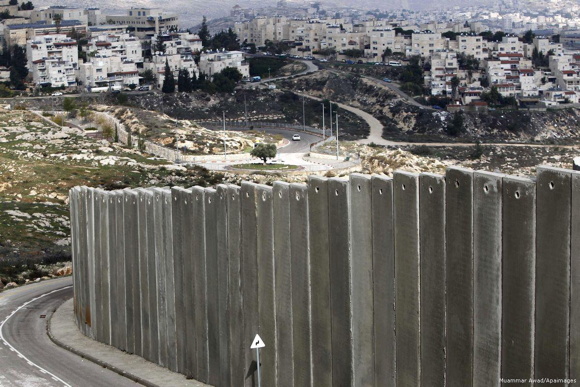
View of a Palestinian refugee camp behind Israel's apartheid wall in east Jerusalem on 3 December 2014 [Muammar Awad/Apaimages]
The argument is always offered as if Palestinians have never tried non-violent resistance, and put forward as a supposedly new idea.
In reality, Palestinians are in a constant state of using unarmed and peaceful protest against Israel. Non-violent forms of Palestinian resistance are as old as Zionism itself. It could not be any other way – although it may receive the support of popular sentiment (as it does in Palestine) armed resistance is by definition the act of a vanguard minority.
…
The sad reality of western media coverage of Palestine is that it rarely pays much attention, unless there are violent reprisals by Palestinians. The greater, ongoing, frequent and systematic Israeli institutional violence of the occupation gets far less attention.
From: Stars of Oscar-nominated Palestinian documentary imprisoned by Israel
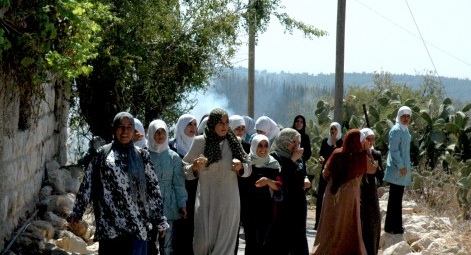
”In 2003, the Palestinian village of Budrus mounted a 10-month-long nonviolent protest to stop a barrier being built across their olive groves. Did you hear about it? Didn't think so. Brazilian filmmaker Julia Bacha asks why we only pay attention to violence in the Israel-Palestine conflict — and not to the nonviolent leaders who may one day bring peace.”
www.womendonors.org → WDN-members-celebrate-the-legacy-of-their-investment-in-the-film-budrus
Some of her quotes relating to Non-Violent Struggle:
◊ ”Non-violence is not glamorous, and you don't see the effects right away.”
◊ ”If we don't pay attention to [nonviolent protests], they are invisible, and it's as if they never happened. But I have seen first hand that if we do, they will multiply.”
◊ ”Nothing scares the army more than nonviolent opposition.”
◊ ”Violent resistance and nonviolent resistance share one very important thing in common: They are both a form of theatre seeking an audience to their cause.”[11]
See also: Julia Bacha's TED talk on non-violence
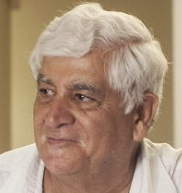 Another example is Mubarak Awad, Greek Orthodox Catholic.[13] When he was in Israel / West Bank / Palestine propagating for the non-violent, unarmed struggle in 1988, what happened?
Another example is Mubarak Awad, Greek Orthodox Catholic.[13] When he was in Israel / West Bank / Palestine propagating for the non-violent, unarmed struggle in 1988, what happened?
They deported him from Israel:
”Five years earlier, he had opened the doors of the Palestinian Centre for the Study of Nonviolence in Jerusalem, with the goal of fomenting mass resistance to the Israeli occupation in the West Bank and Gaza.
Do not pay taxes, he lectured. Consume only local goods…, engage in peaceful protest. Plant olive trees on land coveted by Jewish settlers. Above all, do not pick up the gun. March, and sit down, like civil rights protesters in the American South in the 1960s. Take the beatings, clog up Israeli jails.”
”It started to take, here and there, even though the leaders of the Palestine Liberation Organisation and Hamas disdained it. Awad was arrested on the orders of then Israeli prime minister Yitzhak Shamir and deported.”
For the unarmed, non-violent struggle to succeed it needs the attention of the world media. But the world media is mostly cowardly silent, and very many politicians excuse the crimes of the Zionists.
”Awad insists that constant counselling and instruction in alternatives to violence can work – much as Martin Luther King Jr counselled his followers after the outrages of Birmingham. But many longtime observers think his strategy is, at best, way too late.
Wearied by the Gaza catastrophe, Awad has a fallback position – a kind of nonviolence bottom line. “The most important thing you can say to Hamas and the Palestinians now is, ‘At least you can take a position not to kill women, not to kill children. Have dignity for human rights.’”[14]
That Israel fears Palestinian nonviolence, is also R. Khouri's appreciation.[17]
Israel arrests three leading Palestinian activists in West Bank.
Israeli forces arrest Manal Tamimi, Jamil Barghouti, and Munther Amira,[25] three prominent activists in the nonviolent struggle against the occupation.
The Israeli army arrested a number of prominent activists in the Palestinian popular struggle over the past few days, during protests against President Trump’s declaration on Jerusalem, and the arrests of members of the Tamimi family.
On Thursday, an Israeli military court decided to extend Ahed and her mother Nariman Tamimi’s detention by five more days…
Israel arrests three leading Palestinian activists in West Bank Yael Marom, Dec 29, 2017
5a.) References to the following verses among others:
| 2-190 | only defensive, not offensive war, whatever the circumstances | |
| 2-205 | fasad | Allah abhors disturbance of the peace/ mischief, corruption. |
| 4-128 | wa-Ṣ Ṣulḥu khayr | Reconciliation/ peace is better. |
| 5-16 | guided to the paths of peace | those who seeks His Contentment ( riḍwān - رِضْوَانُه ) |
| 21-107 | the Prophet of Islam sent to the world: as a mercy to mankind. | |
| 39-10 | patience: peaceful response | The steadfast (ṣábirūn ) will be paid w/out reckoning. |
| 25-52 | Jihad: to strive/ to struggle | peaceful struggle, ag. own nafs (ego) & good action |
| 59-23 | Allah’s name: Peace | B9-478 |
| 89-30 | Paradise: home of peace | Dar al Salaam, -the house of peace. (10:25 cc) |
5b.) From the prophetic tradition:
5b1.) In an hadith among many similar ones, Abu Hurairah reported that the Messenger of Allah ﷺ said:
إِنَّ الله رَفِيقٌ يُحِبُّ الرِّفْقَ وَيُعْطِي عَلَيْهِ مَا لاَ يُعْطِي عَلَى الْعُنْفِAllah is Gentle and loves gentleness, and He grants reward for it that He does not grant for harshness.
or:
Allah grants to gentleness (rifq) what He does not grant to violence (unf).
Grade: Sahih; Sunan Ibn Majah 3688, Book 33, Hadith 32, Vol. 5
”The word rifq has been used in this hadith as an antithesis to unf. These terms convey exactly what is meant by violence and nonviolence in present times. This hadith clearly indicates the superiority of the non-violent method.”
Islam Rediscovered, Vaḥīduddīn Khān
5b2.) In another hadith, Ibn Abī Shaybah reported that the Prophet ﷺ said:
”He who is deprived of gentleness is deprived of every good (thing/ trait).”

5b2.) and this hadith ”you are feeding them hot ashes,”[19]:

Just these two hadith prove that gentleness, (or non-harshness) and non-violence in extension lead to powerful and – at first – invisible consequences ( بَرَكَة - baraka). This is a weapon against which the adversary cannot defend himself (as long as this is not a situation of selfdefense in face of a massive threat to life.)
So on condition that you don’t become harsh and resentful, by inspecting your nafs (ego) and controlling it, or even take up arms, Allah will support you against them, and there is no better support than Allah ![]() .
.
5c.) Prophet Muhammad ﷺ employed an active diplomacy of uniting the warring Arab tribes and committing them to peace, but if no peace could be obtained from some of the factions (tribes), the Muslims had to defend themselves, for example when they were attacked three times at Madina by the Meccans.
There are many historic examples - such as the treaty of of Hudaybiyyah - when Muslims made peace agreements based on compromises, which even could appear unfavourable for them at the time.[20] Later on the general political situation developed positively, because the treaty opened a way for the exchange of ideas (incl. explaining the message of Islam) and commerce. The most famous example is the truce of Hudaybiyyah.[12]
The result was a period of 10 years of peace, during which Islam could spread.
Against interference from outside powers, there is one principle: to hold fast to Quran & Sunna, while demanding the disengagement of the arrogant, greedy powers from the Muslim countries, with trade relations on equal terms, which - although necessary - is not a trifle thing in our times.[22]
Prophet Muhammad ﷺ employed certain methods for peace and non-violence:
- the rule of treating well prisoners of war,
- marriage of daughters from other tribes - intermarriage.
For the way of peace and security, many methods can be employed.
What happens in a climate of peace & security?
”Violent activities breed hatred in society, while non-violent activities elicit love [and respect]. Violence is the way of destruction while non-violence is the way of construction.
In an atmosphere of violence, it is enmity which flourishes, while in an atmosphere of non-violence, it is friendship which flourishes.
The method of violence gives way to negative values while the method of non-violence is marked by positive values. The method of violence embroils people in problems, while the method of non-violence leads people to the exploiting of opportunities. In short, violence is death, non-violence is life.
What the violent method invariably does is to awaken the ego (nafs) which necessarily results in a breakdown of social equilibrium. On the other hand, non-violent activism awakens the conscience. From this results an awakening in people of introspection and self-appraisal. And according to the Qur’an, the miraculous outcome of this is that "he who is your enemy will become your dearest friend." (41:34)
A great advantage of the non-violent method is that, by following it, no part of one’s time is wasted.[15]
Shaykh Hamza Yusuf also is of the opinion that ”they [the oppressors/ colonisers] don’t want/ can't handle Non-Violent Movements.”[27]
Example France, January 2016
How Non-violent resistance is giving problems to the pro-Zionist ruling elites.
”The French prime minister has announced that his government plans to intensify its restrictions on free speech targeting the boycott, divestment and sanctions (BDS) movement.
‘This boycott movement is enjoying growing success around the world as the only nonviolent means to put pressure on Israel. It permits everyone who wishes to peacefully demonstrate their solidarity and to protest the favorable treatment that country receives from a large part of the international community despite its constant violations of international law.’
“It is why we call for the support and strengthening of the BDS movement and for the boycott of Israeli goods.”[21]
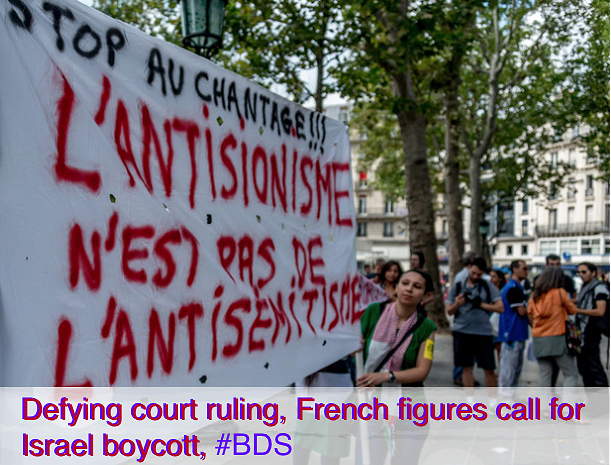
Text: Stop the blackmail!
Anti-Zionism is not anti-semitism!
Best is the way of the unarmed struggle!
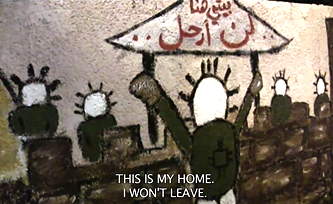
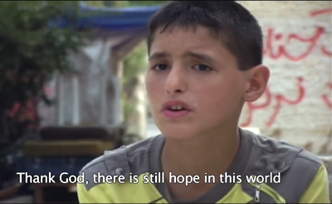
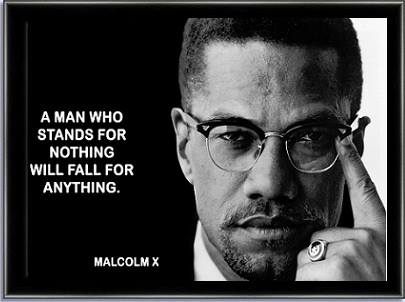
El-hajj Malik el-Shabazz (Malcolm X) said,
I don't reject non-violence. I reject the idea that you burden the oppressed with the commitment to non-violence. Let the oppressors commit themselves to nonviolence.26
@Zebasez
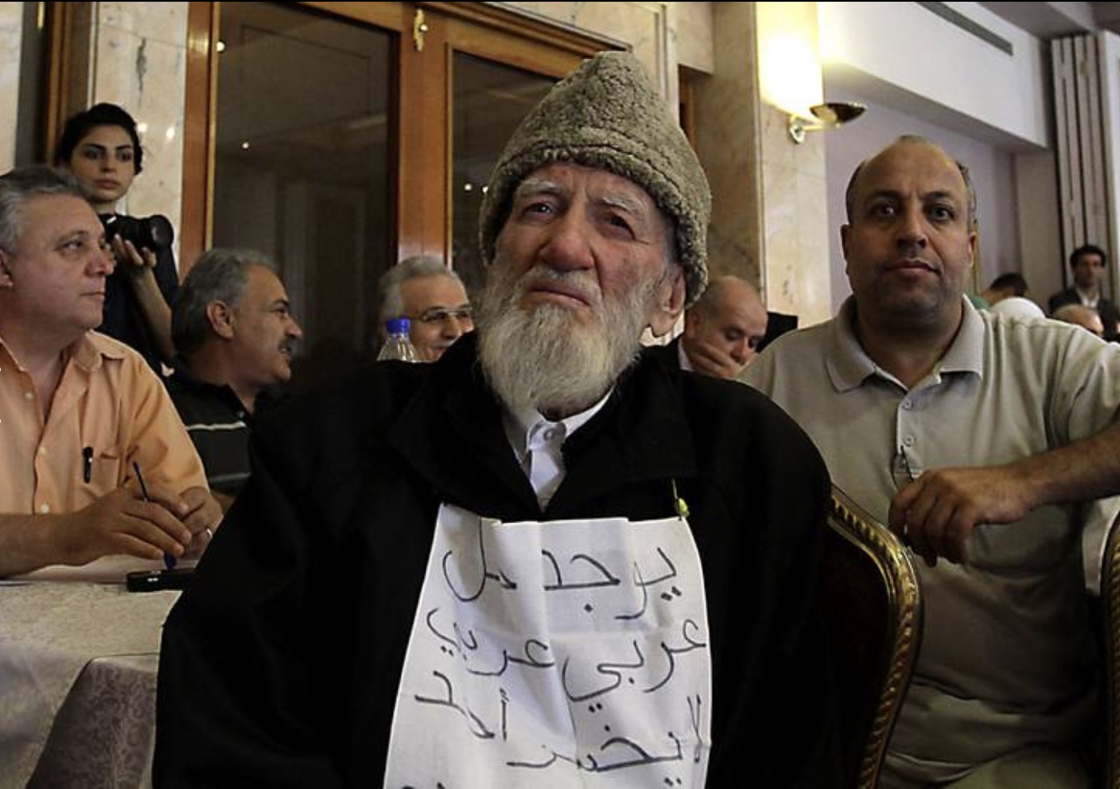
Muslim cleric Jawdat Said holds a sign which says: ‘There is an Arab solution in which nobody loses’. He was attending a public meeting of opposition figures, in the Syrian capital, Damascus, on June 27, 2011, to discuss the uprisings that began in March that year. AFP
Sheikh Jawdat recognised early on in his life on the need to set weapons aside in favour of the power of ideas, and critically think about our ideological heritage.
![]() Jawdat Said, Syrian preacher of non-violent resistance, dies aged 90
Jawdat Said, Syrian preacher of non-violent resistance, dies aged 90

"In any case, what Westerners call civilization, the others would call barbarity, because it is precisely lacking in the essential, that is to say, a principle of a higher order."
René Guénon, East And West, 1924
صلّى الله على سيّدنا محمّد و على آله و صحبه و سلّم
The blessings and peace of Allah on the Prophet, his Family, and his Companions, ( sallAllahu `aleihi wa sallam ) .


Related texts
![]()
1: We remind ourselves that life in the 6th century AC ( 1st Hijri) was without doubt violent - but if we were to compare it to our era, we don't live in less violent times - quite the opposite! ↩
2: In the article the author also draws our attention to a great contempory of Ghandhi:
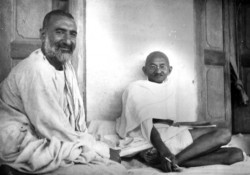 ”Gandhi’s great colleague in the struggle for the freedom of Indian peoples from British colonial rule was Abdul-Ghaffar Khan, who developed his nonviolent understanding independently of Gandhi, through reading the Qur’an in jail.
”Gandhi’s great colleague in the struggle for the freedom of Indian peoples from British colonial rule was Abdul-Ghaffar Khan, who developed his nonviolent understanding independently of Gandhi, through reading the Qur’an in jail.
Abdul-Ghaffar Khan raised an army of 100,000 unarmed soldiers, the Khudai Khidmatgar[10], from the same villages that today yield many fewer young men up to the Taliban. (His arguments must have been more convincing than theirs.) We don’t hear enough about Abdul-Ghaffar Khan because he opposed the partition of the Indian subcontinent, and was vilified for it afterwards. But it is past time to reconsider his work.”
… In hindsight we know that it had been better not to partition the Indian subcontinent.It was split up on ethnic-religious grounds and led to the death of millions of people!↩
- expired link (before 2017) - archives.forusa.org/fellowship/2010/spring/Islamic-nonviolence/11639 - On Islamic Nonviolence by Rabia Terri Harris
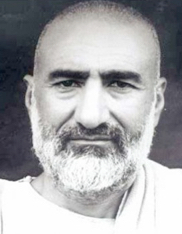 3: Abdul-Ghaffar ”Khan’s work has been emerging recently into a world that desperately needs to receive it. All of Khan’s teachings on nonviolent resistance, peace and reconciliation, and the dignity of the human spirit were rooted in his deep faith. All of his practical work in raising social consciousness, treating all men and women as equals, and producing bounty through sharing were rooted in his understanding of the teachings of Islam.
3: Abdul-Ghaffar ”Khan’s work has been emerging recently into a world that desperately needs to receive it. All of Khan’s teachings on nonviolent resistance, peace and reconciliation, and the dignity of the human spirit were rooted in his deep faith. All of his practical work in raising social consciousness, treating all men and women as equals, and producing bounty through sharing were rooted in his understanding of the teachings of Islam.
”Amazingly, despite spending years of his life in barbaric prisons where he was beaten and tortured, Baacha Khan lived to be 98 years old, ending his life, half of it spent as a social activist in Pakistan, in exile in Afghanistan.”
”These ideas can be supportive to the Pashtuns again, and also for the Kurds, the Balouchs, the Palestinians and other fragmented and oppressed ethnic groups in the region. Unfortunately, the path is not clear. 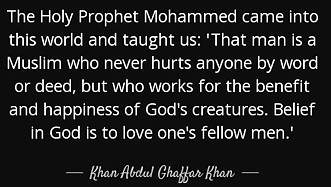 The problems that Khan encountered in Pakistan, essentially an unwillingness on the part of the political power elite to acknowledge the issues of a potential alternative social structure, create a an ever deepening chasm of misunderstanding and separatism within the country. Even so, it should be clear by now that no amount of violence will bridge that gap. This was clear to Abdul Gaffer Khan nearly 100 years ago.” ↩
The problems that Khan encountered in Pakistan, essentially an unwillingness on the part of the political power elite to acknowledge the issues of a potential alternative social structure, create a an ever deepening chasm of misunderstanding and separatism within the country. Even so, it should be clear by now that no amount of violence will bridge that gap. This was clear to Abdul Gaffer Khan nearly 100 years ago.” ↩
- expired link (before 2017) - some-thoughts-abdul-ghaffar-khan-efficacy-nonviolent-resistance - Some Thoughts on Abdul Ghaffar Khan and the Efficacy of Nonviolent Resistance, by Judy Bello
Finally a very important point mentioned in the article is the problem of the interference of the arrogant big powers into the muslim lands:
”Without the interventions (and interference of powerful external agents), nature would bring about a balance of power. … It would seem that the most significant action we can take to enable the emergence of peace and justice in these regions is to bring about the withdrawal of these powerful external players from the region.”↩
- expired link (before 2017) - forusa.org - On Islamic Nonviolence; by Rabia Terri Harris
4: ”In another sermon, he stated, “When we see an armed person in a demonstration, we will tell him this is unacceptable. Go home, we don’t need you.” ↩
5: militant: favouring confrontational or violent methods in support of a political or social cause: the army are in conflict with militant groups.↩
Apple Dictionary
6: ”Nonviolence is the method of pursuing necessary social change by relying upon the real long-term spiritual power of justice rather than the apparent short-term political power of injustice. Today, when put into community practice, this method is called unarmed struggle.” ↩
- expired link (before 2017) - forusa.org/fellowship/2010 - On Islamic Nonviolence; by Rabia Terri Harris
7: ”My question is, if, let’s say, there are people who live in villages deep in the forest, four days walk from anywhere, and a thousand soldiers arrive and burn their villages and kill and rape people to scare them off their land because mining companies want it—what brand of non-violence would the stalwarts of the establishment recommend? Non-violence is radical political theatre…. Non-violence should be a tactic—not an ideology preached from the sidelines to victims of massive violence.”↩
Things That Can And Cannot Be Said by Arundhati Roy and John Cusack
8: ”According to Islam, peace is the rule and war is only an exception. Even in defensive war we have to see the result, if the result is doubtful Muslims should avoid the war even in defensive situation. Some acts of aggression are not enough for Muslims to rush to the war. They have to assess the whole situation and adopt a policy of avoidance when it is not certain to achieve positive result.”↩
Islam As It Is, Maulana Wahiduddin Khan
9: The complete verse (5-16) and the preceding one (5-15) are as follows:
{O People of the Scripture, there has come to you Our Messenger making clear to you much of what you used to conceal of the Scripture and overlooking much. There has come to you from Allah a light and a clear Book.} 5-15
يَهْدِى بِهِ اللهُ مَنِ ٱتَّبَعَ رِضْوَنَهُ سُبُلَ ٱلسَّلَامِ وَيُخْرِجُهُم مِّنَ ٱلظُّلُمَتِ إِلَى ٱلنُّورِ بِإِذْنِهِ وَيَهْدِيهِمْ إِلَىٰ صِرَطٍ مُّسْتَقِيمٍۢ
{By which Allah guides those who pursue His pleasure to the ways of peace and brings them out from darknesses into the light, by His permission, and guides them to a straight path.} 5-16↩
Commentary 1: {By which Allah guides…} referring to Allah's light, which is the holy Prophet ﷺ and a clear Book, which is the Quran.
Commentary 2: Ways of peace translates subul al-salām, which could also mean the path or way to God, since Peace (al-Salām) is one of the Names of God (Muḥammad ibn Jarīr al-Ṭabarī (d. 310/923), Jāmiʿ al-bayān ʿan taʾwīl āy al-Qurʾān)
10: The Text of Khudai Khidmatgar oath:
"I am a Khudai Khidmatgar, and as God needs no service I shall serve him by serving His creatures selflessly. I shall never use violence, I shall not retaliate or take revenge, and I shall forgive any one who indulges in oppression and excesses against me. I shall not be a party to any intrigue, family feuds and enmity, and I shall treat every Pakhtoon as my brother and comrade. I shall give up evil customs and practices. I shall lead a simple life, do good and refrain from wrong doing. I shall develop good character and cultivate good habits. I shall not lead an idle life. I shall expect no reward for my service. I shall be fearless and be prepared for any sacrifice." ↩
11: Non-violence is not glamorous, and you don't see the effects right away.
Julia Bacha ↩
From: azquotes.com Julia Bacha
12: The treaty of Hudaybiyyah: The Muslims – under the leadership of the Prophet ﷺ – signed this treaty with the Quraysh (Suhayl Ibn Amr) in which both sides ”agreed to suspend war for ten years in which people would enjoy security and would refrain from (harming) one another. Also, that whoever from among the Quraysh should come to Muhammad without the permission of his Wali (legal guardian), Muhammad would send him back to them and that if any who is with Muhammad should come to the Quraysh, they would not send him back to him…”↩
sunnah.org → /history/Sahaba/suhayl.html" TARGET="_blank">On Suhayl Ibn Amr and the famous truce of Hudaybiyyah
13: Mubarak Awad ”came to pacifism through violence. His father was killed by Jewish fighters during Israel’s war for independence in 1948 when he was five, but his mother(… told him), ‘Please don’t take revenge for your father, don’t kill anyone, don’t ever destroy a human life.’ And I took that very seriously.”…
Because of my respect for my mother, I always pushed hard for nonviolence. Not only me, but my brothers…”
In the US Mubarak Awad ”established a statewide programme to find homes for wayward youths ensnared by the criminal justice system. In 1978 it evolved into the National Youth Advocate Programme.” ↩
14: ”Many Palestinian youths no longer worry about dying, Awad says. They are egged on by Hamas and even more extreme elements.” ↩
This is a mistake, as it will increase hatred even more. But it is their decision, understandable – when your brother has been killed, and your sister been shot!
Your father in prison and your mother humiliated!
May Allah guide us all!
The 'Palestinian Gandhi' Who Still Believes Non-Violence Is The Answer By Jeff Stein on 8/12/14
15: Towards an Islamic Theology of Nonviolence:
A Critical Appraisal of Maulana Wahiduddin Khan's View of Jihad (Part I & II)
Irfan A. Omar, Marquette University, 2008-09-01
↩
Islamic Theology of Nonviolence (I) & (II) Maulana Wahiduddin Khan
16: A necessary part of any such effort [for coexistence] must be a sincere desire to understand what is behind the Muslims' reverence for the Prophet. For more than a billion Muslims around the world, the Prophet Muhammed is their ultimate example. He is their reference point and, as the Quran explains, "dearer to them than their own selves". ↩
Violence is never an acceptable answer to provocation, Sh Ali Gomaa [fallback]
NB: This page was written before it was learned about Sh Ali Gomaa's role in justifying the Sisi / Egyptian army's slaughter of at least 660 protestors (who were 99.9% peaceful) against the military coup which brought down the elected Mursi government. Sh Ali Gomaa, the Grand Mufti of Egypt, who (on Sep 20, 2012) positioned himself as an advocate of non-violence (see link above), in this case turned 180° and propagated for bloody violence in front of Egyptian army officers. Hypocrisy!
17: ”Palestinians are exploring new means of resisting Israel and its denial of Palestinian refugee rights, including nonviolent resistance through peaceful marches to the borders of Israel. The spectre of refugees (i.e. the grandchildren of the original Palestinian refugees from 1948.) walking to the borders of Israel from four different points – in Lebanon, Syria, the West Bank and Gaza – is a nightmare for Israel for what it portends for the future. If the Palestinians organize such nonviolent marches and other protests skillfully … they will create situations that the Israelis will not be able to control. I would expect, for example, coordinated nonviolent protests that see all Palestinians mobilize simultaneously against Israel…” ↩
- expired link (before 2023-02-05) miftah.org, Israel fears Palestinian nonviolence, by Rami G. Khouri
18: A good analysis with examples how this is usually done is found here:
How The Main Media Distorts The Reality Of The Palestine - Zionist Conflict.
”The fact that thousands of Palestinians and hundreds of Israelis are together employing nonviolent tactics similar to those of the US civil rights movement and the South African anti-Apartheid movement would come as surprising and welcome news to most Americans.
Americans are largely unaware of the struggling but vibrant grassroots nonviolent movement in Palestine, because the US corporate media [and most of the media in many other countries] prefers a simple, flawed story of Palestinian terrorist attacks and Israeli retaliation.
In the US media, Palestinians generally aren’t allowed to speak for themselves or to articulate their historical narrative. Israelis, however, are permitted to speak, to explain the Israeli experience and even to explain about Palestinians. As a result, the Israeli story is known in the US while Palestinians are dehumanized.”
(examples follow …)
↩
Bias and Distorted Media Coverage, Nonviolent Resistance in Palestine, Patrick O’Connor, 2005
20: Even Omar ibn al-Khattāb  had a problem with it initially. This shows that the prophetic way by the Messenger of Allah
had a problem with it initially. This shows that the prophetic way by the Messenger of Allah  was above of what even the most ardent followers would imagine. But they had the guidance of the Prophet
was above of what even the most ardent followers would imagine. But they had the guidance of the Prophet  , who was among them.↩
, who was among them.↩
21: ”In a speech to the French Israel lobby group CRIF on Monday, [French Prime Minister] Valls said that his government would be taking further measures to ban demonstrations in support of BDS.
'We have passed from criticism of Israel to anti-Zionism and from anti-Zionism to anti-Semitism,' Valls claimed.
'We will be taking measures,' he announced, 'that will demonstrate that enough is enough and we cannot allow everything in our country.'
Last month Valls warned that robust criticism of Israel’s Zionist state ideology is being viewed as anti-Semitism.↩
See aso: Valls declaring himself as ’eternally tied’ to Israel, and expressing Islamophobic views. [New French prime minister ’eternally tied’ to Israel]
Defying court ruling, French figures call for Israel boycott
22: Trade relations on equal terms: this is an old-standing demand by the countries of the South, necessary for development - in the age of globalization. See forthcoming text on the benefits and problems of globalization - as we know it today. ↩
23: This above is the abstract of the article: The Islamic Principles of Social Justice: Maulana Abul Kalam Azad and Nonviolent Civil Disobedience, by Hayat Alvi (Associate Professor, US Naval War College, Newport, Rhode Island, USA.) A pdf-download-link is [here]. ↩
The Islamic Principles of Social Justice: Maulana Abul Kalam Azad…, Hayat Alvi
24: From Paul K. Chappell, Soldiers of Peace, a review of his book is here. ↩
25:
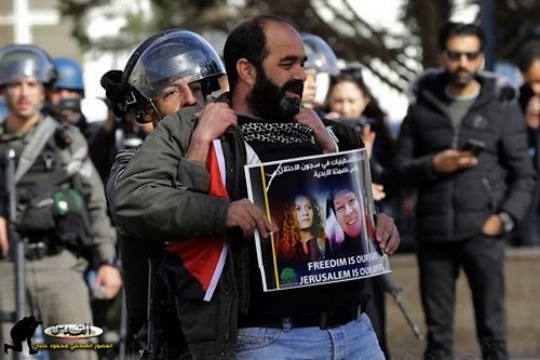
Israeli forces arrest Munther Amira during a demonstration in support of the Tamimi women, Bethlehem, West Bank, December 27, 2017. ↩
26: The media portrayed him as an angry and violent man, an advocate of race war, although a textual analysis (hwalterlippmann-mx-nyt ) of his statements on violence suggests that, particularly in the later years of his life, he advocated only self-defense. ↩
Quoted from: Violence Prevention: Reconsidering Malcolm X